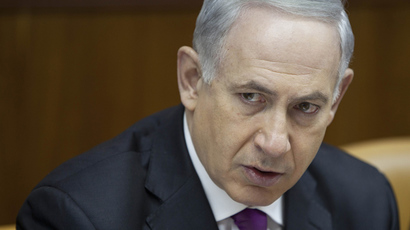Israel, Palestine back to negotiating table after 3yr stalemate
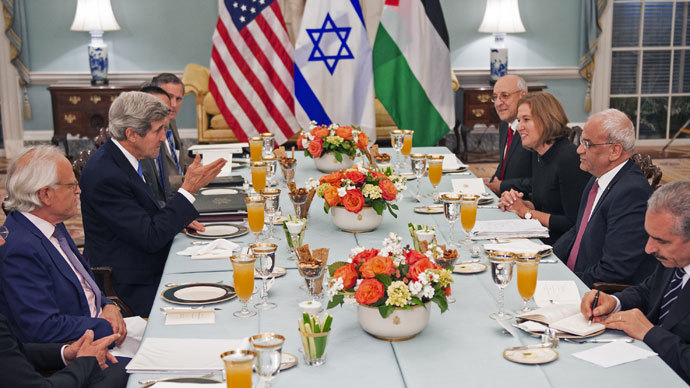
Israeli and Palestinian teams have arrived in Washington to resume the Middle-East peace process after nearly three years of deadlock. Though optimism is in short supply ahead of the talks, with none of the sides eager to back down on its demands.
The two delegations began their meeting at the Iftar dinner
breaking the Ramadan fast to be served on Monday evening at the
Washington home of US Secretary of State John Kerry, who brokered
the talks.
The meal was thought to be relatively informal and intended
primarily to establish a friendly atmosphere between the Israeli
and Palestinian negotiators.
Prior to the meeting, Kerry named former US ambassador to Israel,
Martin Indyk, as Washington's envoy overseeing the
Israeli-Palestinian peace process.
“He knows what has worked, and he knows what hasn’t worked,” Kerry said in the Monday announcement. “And he knows how important this is to get this right.”
Indyk previously served as ambassador to Israel under US President Bill Clinton and, as Kerry told reporters, understands the “art” of negotiating in the region. He is currently a fellow at the Brookings Institution think tank.
“Going forward, it is no secret that this is a difficult process – if it was easy it would have happened a long time ago,” he continued. “It’s no secret therefore that many difficult choices therefore lie ahead for the negotiators, and for the leaders, and as we seek reasonable compromises on tough, complicated, emotional and symbolic issues.”
Indyk told reporters that the goal of the meetings is to have “two states, living side by side, in peace and security” - a task he deemed a “daunting and humbling challenge.”
The US State Department said the aim of the current talks is to
try to come up a work plan for the broader negotiations.
"The meetings in Washington will mark the beginning of these
talks," Kerry spokeswoman Jen Psaki said. "They will serve
as an opportunity to develop a procedural work plan for how the
parties can proceed with the negotiations in the coming
months."
Israel is represented by chief negotiator Tzipi Livni and veteran
Netanyahu adviser, Yitzhak Molcho, at the negotiations, with the
Palestinian team consisting of chief negotiator Saeb Erekat and
Abbas aide Mohammed Shtayyeh.
The Israeli and Palestinian teams will meet with Kerry again in
the State Department building on Tuesday. The joint press
statement will be read out by the Secretary of State afterwards
that will officially declare the start of negotiations.
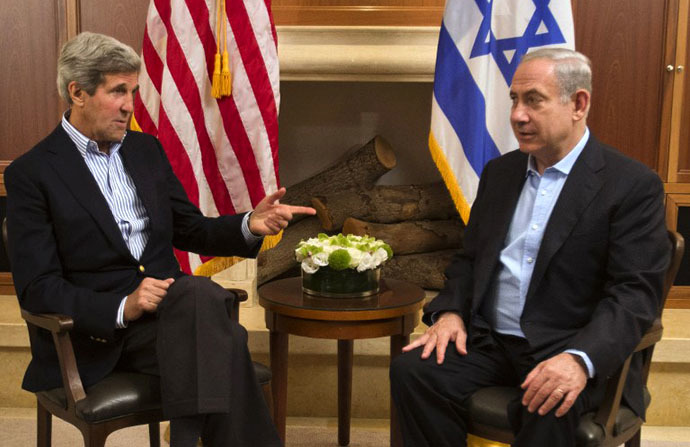
The actual talks are to be held later in the region. They’re
expected to last from six to nine months.
Before her departure for Washington, Livni told Haaretz newspaper that she approached the talks “cautiously, but also with hope.”
Palestinian spokeswoman Hanan Ashrawi noted that the current
talks are being held under more difficult conditions than
previous negotiations.
She cited the Palestinian political split between moderate
President Mahmoud Abbas and the Islamic militant Hamas, as well
as the more hawkish positions of Israeli Prime Minister Benjamin
Netanyahu in comparison with his predecessor.
“But I think there is a recognition of the urgency,” Ashrawi
said. “If we don't move fast and decisively, things could fall
apart.”
A major faction of the Palestine Liberation Organization has
rejected the peace talks just hours before the Israeli and
Palestinian delegations’ meeting in Washington, AFP
reports.
The leftist Popular Front for the Liberation of Palestine said
that the resumption of negotiations was “an individual move” by
president Abbas, which did not have the backing of the PLO as a
whole.
One of the party's leaders, Khaleda Jarar, spoke out against the
American involvement in the talks, saying that “we went to the
UN precisely to take our case out of US hands."
The resumption of talks between Israel and Palestine comes after
half-a-year of shuttle diplomacy by Kerry. The announcement that
Israel and Palestine had laid groundwork for the revival of the
peace dialogue was made by the Secretary Of State on July 19 in
Amman, Jordan.
Palestinian territorial demands
The peace process in the region was stalled for nearly three
years as Abbas saw no point in talking to Netanyahu, fearing the
hard-line Israeli leader would reject what the Palestinians
consider “minimal territorial demands.”
The Palestinians want the borders of their future state
approximating the boundaries of the West Bank, Gaza and east
Jerusalem – the territories, which were captured by Israel in the
1967 Middle East war.
But they have accepted the principle of limited land swaps to
allow the Israelis to annex some of the dozens of settlements it
has built on war-won lands.
Abbas had repeatedly stated that he will begin negotiations only
if Israel either freezes settlement building or recognizes the
1967 lines as a starting point for drawing the border of a state
of Palestine.
Abbas seemed to undercut the hopeful tone just before the talks began, telling reporters that no Israeli settlers or border forces would be allowed to remain in Palestine under a truce agreement.
“In a final resolution, we would not see the presence of a single Israeli – civilian or soldier – on our lands,” he to a contingent of mostly Egyptian journalists on Monday. “An international, multinational presence like in Sinai, Lebanon and Syria – we are with that,” he went on, referring to United Nations peacekeeping missions.
Palestinian officials said on Monday that they received
assurances from Washington that the US sees the 1967 lines as the
basis for border talks.
However, a senior Abbas aide, who talked to AP on condition of
anonymity, acknowledged that the Israeli side hasn’t signed on to
that principle.
In recent days, senior Israeli officials have also repeated that
settlement construction on the disputed land would
continue.
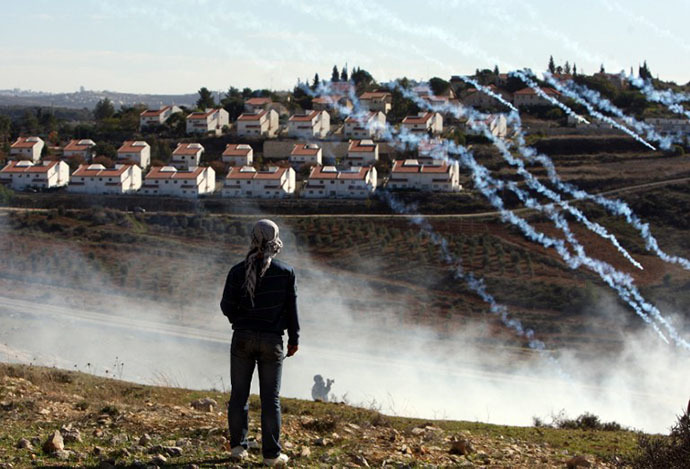
Israel considers all of Jerusalem as its capital – despite that
status not being recognized internationally – and wants to keep
its settlement blocs in the West Bank under any peace treaty.
Israel left Gaza in 2005 and that enclave is currently ruled by
Hamas Islamists organization, which considers the Jewish state
its prime enemy and opposes Abbas's peace strategy.
Resuming negotiations “is a dangerous step and the only
beneficiary is the occupation [Israel], which uses it as a cover
for its continued crimes,'' Hamas spokesman, Sami Abu Zuhri,
said on Monday.
The Israeli government also denies the right of the Palestinian
refugees from the 1948 War, which saw the Israeli state
foundation, to return to their original homes, calling it a
“demographic suicide.”
Netanyahu says any peace accord must safeguard Israel, being
concerned that Hamas could gain new ground in the West Bank, with
Kerry has described the security of the Jewish state as
"paramount".
Meanwhile the Palestinians accuse Tel Aviv and Washington of
discussing security without including them into the process.
"This is a big shortcoming in the Israeli and the American
behavior because they are not discussing their bilateral
security, they are discussing a central and a fundamental issue
of ours and it concerns our future as a whole," Yasser Abed
Rabbo, a top official in Abbas's umbrella Palestine Liberation
Organization, told Reuters.
Prisoners’ release
The Palestinian official said the expected prisoner release of
the prisoners played a huge role in persuading Abbas to give
negotiations another chance, even without Israel meeting his
long-standing demands on the terms of such talks.
The Israeli cabinet’s decision to free 104 long-held Palestinian
inmates, who had been behind bars since before the signing of the
Oslo Accords in 1993, has drawn some angry reactions in
Israel.
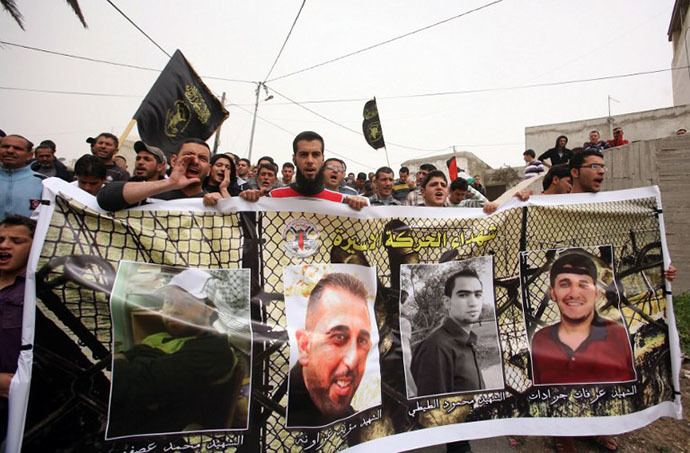
Palestinians tend to view the prisoners as heroes, who sacrificed
for the struggle for statehood, while many Israelis seem them as
cold-blooded killers.
The list of prisoners eligible for release includes those, who
murdered or wounded Israelis or killed Palestinian informers.
“The murderers will be released,” the front-page headline
of Israel's Yediot Ahronot daily read on Monday.
Israel’s Economy Minister Naftali Bennett was among those opposed
the prisoner releases. He warned against re-starting talks with
the Palestinians, saying the two-state concept is
“fundamentally wrong.”
Despite opposition in his cabinet, Netanyahu still pushed the Sunday's approval through with a comfortable 13-7 vote, with two abstentions.
Netanyahu wrote an open letter to Israelis on Saturday, telling them that while it will be difficult to accept the freedom of former prisoners, “prime ministers from time to time make decisions that go against public opinion, when it is important for the country to do so.”
“This moment is not easy for me,” he told cabinet members over the weekend. “It is not easy for the ministers. It is not easy especially for the families, the bereaved families, whose heart I understand. But there are moments in which tough decisions must be made for the good of the country and this is one of those moments.”
“There’s a steep price to this decision, but not launching the
diplomatic process carries a heavier price,” Netanyahu is
cited as saying by Haaretz. "Launching the process will help
Israel's strategic interests. A team under my leadership will
approve the names of those to be released, and if the
Palestinians commit provocations during the process, we will stop
the releases immediately.”












